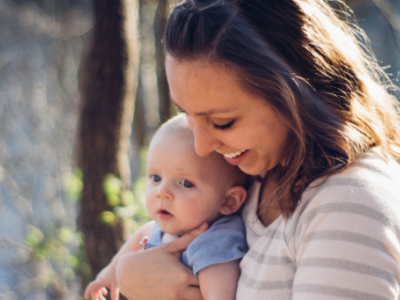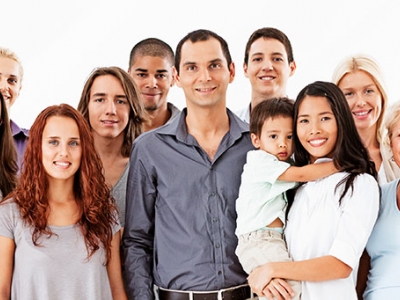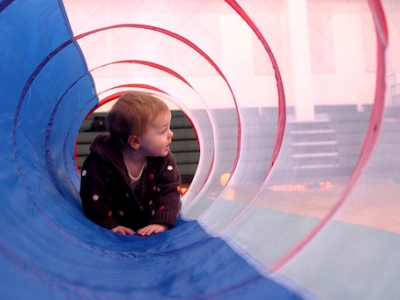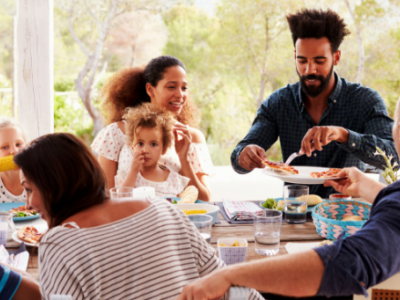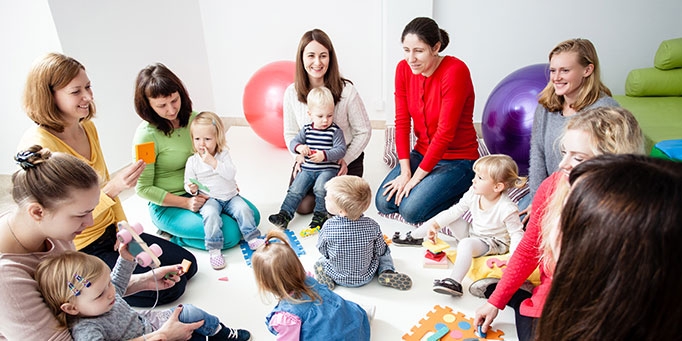
The science is in: parents need community
A look at the ‘why’ and ‘how’ of community from Jodi Koepke from MOPS Australia.
When our first baby was born and the time came to leave hospital, I remember the feeling of disbelief: could the hospital staff really allow me to walk out of the door with this tiny, vulnerable infant? It was mildly terrifying to go home and know that I was on my own in this new endeavour of raising a child.
Only I wasn’t on my own, really. I had my loving husband, our extended family coming to help out and check up on us, midwives and child health nurses checking in for the first little while, and friends. This support was crucial in those early days.
Over time, these supports reduced or changed in nature. In many ways, I was not in a great headspace as we navigated sleep deprivation as well as some unexpected issues with my daughter. I needed a wider community to connect with on my ongoing parenting journey.
What research tells us
Researchers have known for decades that strong community connections—where parents feel a sense of belonging and engagement—are associated with lower stress levels and more optimistic views on parenting.1 These findings are confirmed and extended in subsequent research, such as a study of military families which explored the relationship between parents’ community connections and adolescent wellbeing.2 According to that study:
Parents with stronger community connections, including greater sense of community and community engagement, reported more resilient coping when faced with adversity. The resilient coping of mothers, in turn, was particularly significant for more positive youth outcomes, when compared to that of fathers.
In our western cultures, it can be so easy to fall into the false belief that we should be independent and ‘have it all together’ as parents. Social media can parade a highlight reel of other people’s lives, which makes us think we need to hide the areas we’re struggling with in ours. We also have an abundance of information at our fingertips that we can access from the comfort of our own homes. Since we can find so much online, there isn’t the same natural draw to get out into the community to learn from each other.
But finding information on the internet just isn’t the same as talking with other people face-to-face. I can learn many things online but tend to be left overwhelmed by it all. It is only when I connect with other parents, get vulnerable with my struggles and listen to the stories of others that my perspective shifts and I am able to grow. It isn’t about having facts but about sharing experiences.
Finding safe and supportive communities
Of course, this only works if the community we join is a safe and loving space! I have heard many horror stories of people’s negative experiences at some mothers’ groups. I am grateful that the communities I have sought out, both in person and online, have been warm and welcoming places.
For me, the most impactful community was my local MOPS (Mothers of Preschoolers) group run by my church. Here I found a sisterhood of mums in the same season of life, along with some mentor mums to offer prayer, wisdom and encouragement. I could be authentic and vulnerable about what I was going through. I flourished in this group, grew into various leadership roles and now have the privilege of investing back into the organisation as a whole.
Family and friends are a great start when it comes to finding community, but they can’t be everything to us. I have found my church to be another great place where I can belong. When we brought our baby daughter to be dedicated, the pastor invited our church family to commit themselves to supporting us in raising her. As we have stayed involved in our church community, this has proven to be the case. We have been able to ‘carry each other’s burdens’ as Paul instructed in Galatians 6:2.
Ideas for connecting with a community
For mums:
- Find your local MOPS group (if you have young children) or MUMSNext group (if you have slightly older children): https://mops.org.au/mopsgroups/find-a-mops-group. If there isn’t a group nearby, ask your church to consider starting one.
- Join in with the women’s events and activities happening in your local church.
- Join an exercise group designed for mums.
- Seek out a mentor.
For dads:
- Find out about dads’ or men’s events happening in your local church.
- Seek out a mentor.
- Join an exercise group.
For both parents:
- Find supportive online communities, such as parent groups run by organisations you trust, for example ChildSafe Australia or Christian Parenting Australia.
- Take a parenting course together and intentionally connect with the other participants.
- Find groups that meet around an interest, such as a cycling or craft group.
- Join a small group at your local church and commit to engaging with the other members.
- Attend business networking events and extend your conversations beyond business.
The investment is worth it
One thing I have discovered is that community takes intention and participation. Connection doesn’t happen in an instant—it takes time to develop. Connection also involves give and take—it isn’t just about what I can get from a group. In fact, some of my greatest joy has come from being able to support and invest in others around me.
I know it can feel like joining a community is just one more thing to do when you’re already feeling stretched. But let me assure you—the investment of time and effort is worth it. Being part of a supportive community not only benefits you. Your children will also reap the rewards of having a parent who is less stressed and more resilient. The science confirms it: we were designed for community.
[1] Crnic, K, Greenberg, M, Ragozin, A, Robinson, N, & Basham, R 1983, ‘Effects of Stress and Social Support on Mothers and Premature and Full-Term Infants’, Child Development, vol. 54, issue 1, pp. 209–217.
[2] O'Neal, CW, Mallette, JK, & Mancini, JA 2018, ‘The Importance of Parents' Community Connections for Adolescent Well-being: An Examination of Military Families’, American journal of community psychology, vol. 61, issue 1–2, pp. 204–217.
---
Jodi Koepke spends her days sharing words of encouragement for women in leadership, finding her way through the beautiful mess of parenting and relationships and geeking out on technology. She is the author of Stepping Up In Leadership, a speaker and podcaster and the Managing Director for MOPS Australia. Find her at www.jokoepke.com.
For more articles from Growing Faith, subscribe to our monthly e-newsletter.
To hear about the latest books and resources from Youthworks Media, subscribe here.


